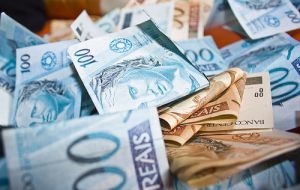MercoPress. South Atlantic News Agency
Brazil doubles tax on foreign investors buying local bonds and fixed return assets
 The Real has more than doubled in value since Lula da Silva took office
The Real has more than doubled in value since Lula da Silva took office Brazil doubled this week the tax on foreign investors buying local bonds or making deposits in fixed returns in an attempt to curb a currency rally that has turned into an issue in the country's presidential race.
As emerging economies globally struggle to cope with hot investment inflows that have pushed up their currencies, Finance Minister Guido Mantega said the so-called IOF (financial operations tax) will rise to 4% from 2% starting Tuesday.
However the measure does not include risk capital (i.e. stock exchange) and foreign direct (productive) investments.
Finance ministers and central bankers are expected to focus on what Mantega has called an “international currency war” at an International Monetary Fund meeting in Washington this week.
The United States, struggling to recover from its deepest recession since World War II, has said China distorts the global economy by undervaluing its currency. But many emerging economies instead blame ultra-low interest rates in the US and other rich countries for hot-money flows into their markets.
With Brazilian interest rates among the world's highest at 10.75%, foreign investors are pouring cash into the country in search of steep returns.
Despite problems faced by Brazilian exporters, analysts had doubted the government would announce new measures after Sunday's presidential election, with some predicting that new moves to curb the Real would only come after a runoff on Oct. 31.
“I think the electoral impact is limited but it could make it harder for Serra to criticize the government for not doing enough to curb the Real rally,” said Ricardo Amorim, president of Ricam Consultoria, a Sao Paulo consulting firm.
“There’s growing interest from foreign investors in Brazil and this latest decision is geared to avoid the appreciation of the Real and harm to our exports”, said Mantega. “We are concerned that a steep increase in the value of the Real hampers exports and floods the domestic market with cheap prices”.
Since the second half of 2009 the Brazilian government has been assessing “additional complementary measures” given the “excess” of US dollars in the market which trigger complaints from exporters because of loss of competitiveness.
Mantega also announced that Brazil would be taking the “money exchange rates” issue to the IMF annual assembly and the G-20 meeting in Seoul. The Brazilian minister made the statement following Japan’s decision to weaken the Yen to help boost exports.
The weakening tendency of the US dollar has become a constant headache for Brazilian authorities that have promised to address the issue and help depreciate the Real. So far this year the Real has strengthened 3.03% after having appreciated 32.7% against the US dollar thus recovering from the 23.17% losses experienced in 2008.
Since Lula da Silva took office in 2002 the Brazilian currency has appreciated 108.84% against the US dollar, from 3.53 to the current 1.69.




Top Comments
Disclaimer & comment rulesCommenting for this story is now closed.
If you have a Facebook account, become a fan and comment on our Facebook Page!